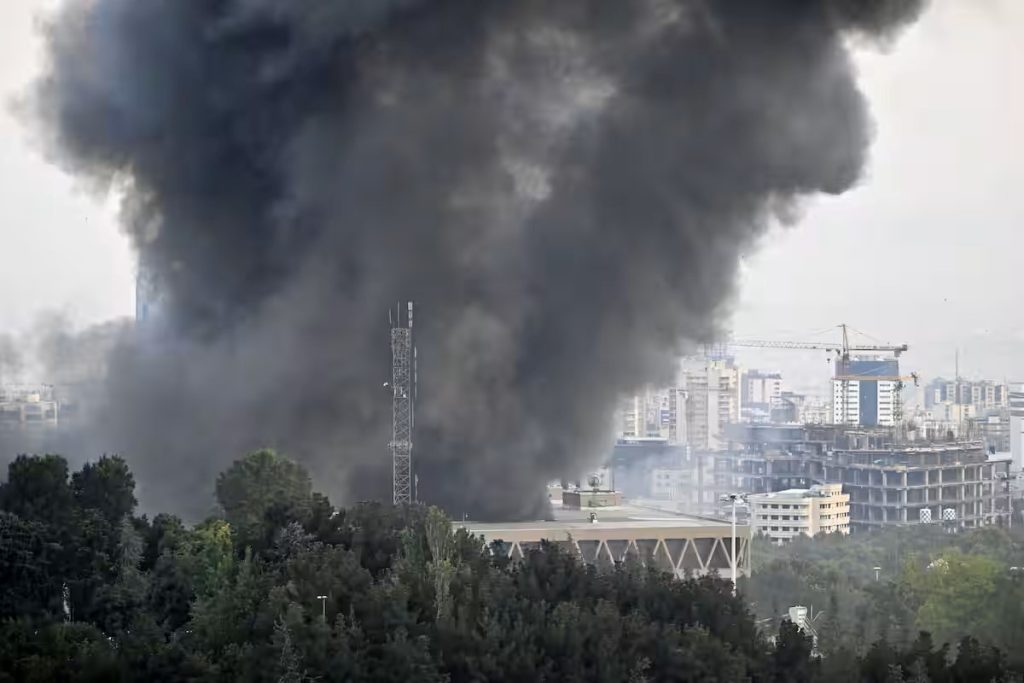
On June 23, a crowd in Tehran, the capital of Iran, celebrates a retaliatory attack on a US military base in Qatar. (© WANA, Reuters via Kyodo)
このページを 日本語 で読む
United States President Donald Trump announced that the warring nations of Israel and Iran have agreed to a "complete and total ceasefire."
According to US media reports, Qatar had mediated the ceasefire plan. It officially took effect at 7:00 AM local time on Tuesday, June 24.
Trump said he thought the ceasefire would "last permanently," although uncertainty remains. We urge both Israel and Iran to exercise maximum restraint, adhere to the ceasefire, and bring the war to an end.

The June War
Israeli aircraft began attacking Iranian nuclear facilities and other military targets on June 13. Their stated intention was to prevent Iran from acquiring nuclear weapons. Iran retaliated with ballistic missiles fired at Israel. Although Israel maintained the upper hand, it could not seriously damage Iran's nuclear facilities. Then, on June 21, the US dropped bunker buster bombs on three of Iran's nuclear facilities.
In the background, Iran had quickly and significantly increased its store of uranium fuel enriched to 60%, "a short technical step away" from weapons-grade levels, reported the Associated Press, quoting from a May 31 International Atomic Energy Agency (IAEA) report. There was concern that Tehran would be able to enrich this stock of uranium to 90% quickly to produce nuclear weapons.
Moreover, Iran has explicitly stated it does not recognize Israel's right to exist as a state. There were fears that if Iran acquired nuclear weapons, it could use them to attack Israel, either directly or by using pro-Iranian militant proxies. That in turn could set off a nuclear war.
Trump delivered a short speech immediately after the B-2 bombers dropped the bunker busters. In it, he urged Iran to make peace quickly, framing it as a choice between "peace or tragedy." The Trump administration has not hesitated to use force. Fairly speaking, it has pushed the Iranian leadership into a corner ー if the ceasefire holds.

Strait of Hormuz and Other Concerns
However, we must be cautious about Iran's actions going forward. There are likely forces within the Iranian military and the Revolutionary Guard who undoubtedly harbor a desire for retaliation. They would not likely take kindly to such a one-sided thrashing. The same holds true for pro-Iranian militant groups. Military and terrorist attacks would not be surprising.
Concerns also remain that Iranian hardliners could block the Strait of Hormuz. That narrow neck of water is a major artery for global shipments of crude oil, including those bound for Japan. Alternatively, they could attack US naval vessels or tankers belonging to Western nations. Japan and Europe must urge Iran to exercise restraint.
Adhering to Nuclear Non-Proliferation Promises
The most important thing is to eliminate the root cause of the war. We would like to see Iran declare that it will not become a nuclear weapons power. It must cooperate with IAEA inspections and agree to the destruction of its uranium-enrichment facilities. The Iranians must also turn over to the IAEA any highly enriched uranium they might be concealing.
Withdrawing from the Treaty on the Non-Proliferation of Nuclear Weapons, as some in the Islamic Consultative Assembly (Iranian Parliament) are calling for, or other such actions, must not happen.
RELATED:
- To Enjoy Peace, Iran Must Abandon Its Nuclear Program
- Iran Hit by US Strikes, Japan Pulls Out Nationals
- Speaking Out | As Iran Heats Up, Japan Faces a National Crisis
Author: Editorial Board, The Sankei Shimbun
このページを 日本語 で読む







